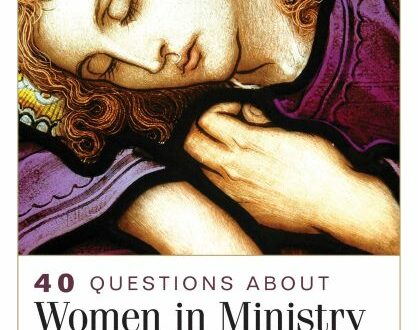Samaritan Woman: Stay Away from Me?
I received a question this week from a former student, Vernita, about the Samaritan woman, whose story John records in the fourth chapter of his Gospel.
Vernita: I'm looking for any credible historical data to support the statements I've read in some commentaries which suggest the Samaritan woman was an outcast in her society and came to the well later in the day than most women in order to avoid the scorn of that crowd. Are you aware of any writings that specifically and definitively state that, or would that be speculation based on what we know about that society?
Me: English translations tell us, "It was about noon" (Jn. 4:6). The Greek says it was the sixth hour. Some take that to mean from midnight—that is, 6 a.m. But because John elsewhere gives the time of Jesus's death as being about the sixth hour (19:14), or noon, making it correspond with the time Passover lambs began to be sacrificed, it is more likely that in the John 4:6 reference he also means noon. But know there is some discussion about whether it is actually noon in the first place.
Now then, much meaning has been read into this time detail. Sure, it is possible the Samaritan woman was at the well alone because she was a moral outcast.
But it’s also possible she was there because she was infertile and poor–thus, she herself went instead of sending one of her children. Some of our African friends have this expression: “An infertile woman sends her own thigh.” Since the Samaritan woman had no one else to send, she had to go herself.
Many assume women drew water only once a day. But if we look at the developing world today, women may go to haul water three times a day or even more–depending on how much water they need and how much they can carry in one trip. So we probably should not assume there was only one set time for most to gather.
Our knowledge of more agrarian cultures can help us here. And based on what I’ve seen in the developing world, I suspect this woman was actually not an adulteress or a fornicator. Rather, she had endured the loss of six husbands. Some of them might have died. And some (most) might have left her. Infertility could have been a key reason. Women in Samaria typically could not just up and divorce their husbands. Especially not five of them. How would such women eat if they did that? No, it was the men who typically initiated divorce. So she had probably been dumped and/or bereaved of her man five times.
The sixth time, it's likely she had to settle for a polygamous arrangement to keep from starving. If so, she would have been the wife who got stuck doing the work because she could not bear children. This scenario better fits a society where women were treated as chattel (they were in first-century Samaria), and it accounts for why a grown woman would be fetching water. It also better fits a context in which women did not typically initiate divorce, and where women who were infertile were often abandoned.
Notice in Luke’s story about Elizabeth and Zechariah that when the formerly infertile Elizabeth conceives, she rejoices that she no longer feels shame in the sight of the people (Luke 1:25, emphasis mine). It was “shameful” for a woman in first-century Palestine to be infertile. If the Samaritan woman was actually avoiding other women, infertility is the more likely factor.
If such is the case, imagine the impact of Jesus's words: "Go call your husband."
"I don't have one."
"You're right. You've had five, and you have to share the one you have now." Said with compassion. And concern for the grief and injustice. (Not facing her about her sin.)
"You're a prophet! (How else could you know all that?) We're hoping for Messiah!"
"I AM."
Jesus, who usually talks in enigmatic statements about his identity, comes right out and tells this woman longing for Messiah that he’s the one! And suddenly the social hider is running to make a public announcement.
Through the centuries, we have tended to see sexual sin lurking in the closets of most women in the Bible. Certainly Jesus saves sinners. But in light of what we know of cultural background, especially in this case, I think we need another look.
If, indeed, Jesus was not confronting this woman about her sexual failures, but was showing empathy, what might that tell us about the wisdom of beginning our evangelism conversations with confrontations about sin?



4 Comments
Ben Blaney
comment on the Samaritan woman at the well
I think this account is an incredible Biblical example of Matt. 4:4 "Man shall not live by bread alone, but by every Word that proceeds from the mouth of God." Jesus spoke truth into this Samaritan woman's life in just one conversation at the well. The words that proceeded from His mouth brought life to this woman and took an axe to the root lie that she had believed about herself and her worth and He is still doing that today!! Note she asked God a bunch of specific questions, she listened and was changed by His Rhema (Words).
Susan127
Was the Samaritan Woman’s 6th marriage really polygamous?
Why have you changed Jesus' words in your paraphrase to make it seem like he was calling the Samaritan Woman's sixth marriage polygamous? Your article says so much that's good, but I don't understand why you're distorting the Scriptural account of Jesus' interaction with her. Your theory fits well enough with Jesus' actual words.
Sandra Glahn
Was It Polygamy, Adultery, or Fornication?
Jesus's words as recorded in v. 44 are "you have had five husbands, and the one you have is not your own." English translators have rendered "not your own" in a variety of ways, depending on what they think Jesus meant. Indeed, we could read his words several ways:
1. The woman is committing adultery. That is, the man is someone else's.
2. She is living with someone w/ whom she's not married. Living together is pretty common in America. I'm not so sure it was common in Samaria in the first century.
3. She is living in a polygamous relationship in which she is married, but the man to whom she is married is not hers alone. Thus, "not your own" means "shared with someone else."
I was in no way trying to distort the words of our Lord. Rather, I was seeking to show another interpretation we would do well to consider in light of what we know about women rarely initiating divorce at that time.
For more on this possibility, check out the book, Gospel Women, by Bauckham.
Sandra Glahn
P.S.: Some documentation
Lynn Cohick, in her book, Women in the World of the Earliest Christians (Baker Academic), cites a number of cases in the first centuries BC and AD in which couples divorced for infertility (see pp. 109–10). She also notes that polygyny was present in the Jewish community at least through the second century AD (p. 112).